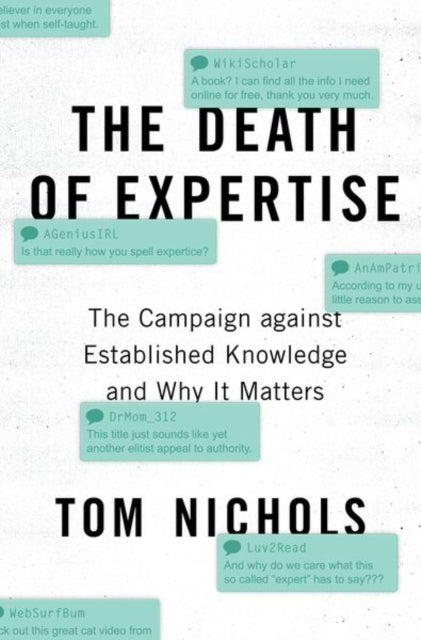TomNichols
Death of Expertise: The Campaign against Established Knowledge and Why it Matters
Death of Expertise: The Campaign against Established Knowledge and Why it Matters
YOU SAVE £2.73
- Condition: Brand new
- UK Delivery times: Usually arrives within 2 - 3 working days
- UK Shipping: Fee starts at £2.39. Subject to product weight & dimension
Bulk ordering. Want 15 or more copies? Get a personalised quote and bigger discounts. Learn more about bulk orders.
Couldn't load pickup availability
- More about Death of Expertise: The Campaign against Established Knowledge and Why it Matters
The increasing availability of information has led to a rise in narcissistic and misguided intellectual egalitarianism, which has crippled informed debates on various issues. This rejection of experts has been caused by the internet, the emergence of a customer satisfaction model in higher education, and the transformation of the news industry into a 24-hour entertainment machine. Tom Nichols' book, "The Death of Expertise," explores this phenomenon and warns that democratic institutions are in danger of falling to populism or technocracy or a combination of both.
Format: Paperback / softback
Length: 280 pages
Publication date: 24 January 2019
Publisher: Oxford University Press Inc
In the modern era, individuals are exposed to an unprecedented abundance of information, facilitated by technological advancements and expanding access to education. While these societal advancements have brought about numerous benefits, they have also contributed to the rise of narcissistic and misguided intellectual egalitarianism, hindering informed discussions on various issues. The pervasive belief that everyone possesses an equal level of knowledge, derived from a mere glance at WebMD or Wikipedia, has led to a situation where average citizens perceive themselves on par with doctors and diplomats. Every voice, regardless of its credibility, demands to be treated with equal seriousness, and any assertion to the contrary is dismissed as undemocratic elitism.
This rejection of expertise has been influenced by various factors, including the openness of the internet, the emergence of a customer satisfaction model in higher education, and the transformation of the news industry into a 24-hour entertainment machine. Paradoxically, the widespread dissemination of information, intended to empower individuals, has instead resulted in the creation of an army of ill-informed and angry citizens who denounce intellectual achievement.
Tom Nichols, in his book "The Death of Expertise," delves deeper into these concerns, highlighting that when ordinary citizens believe that no one knows more than anyone else, democratic institutions themselves are at risk of succumbing to populism or technocracy, or even a combination of both. The book serves as both an exploration of a dangerous phenomenon and a warning about the stability and survival of modern democracy in the Information Age.
The rise of narcissistic intellectual egalitarianism has profound implications for society. It undermines the credibility of experts and professionals, leading to a decline in the quality of decision-making and policy-making. It also perpetuates misinformation and fake news, as individuals are more likely to believe information that aligns with their personal beliefs or reinforces their biases. This can have serious consequences for public health, safety, and the well-being of society as a whole.
To address these challenges, it is essential to promote critical thinking and media literacy education. Individuals should be taught to evaluate information sources, identify biases, and distinguish between fact and opinion. This can help empower individuals to make informed decisions and contribute to meaningful discussions.
Furthermore, institutions such as schools, universities, and media organizations should prioritize the cultivation of expertise and the dissemination of accurate information. This can involve investing in research and development, promoting interdisciplinary collaboration, and fostering a culture of intellectual humility and respect.
In conclusion, the rejection of expertise and the rise of narcissistic intellectual egalitarianism pose significant threats to modern democracy. It is essential to address these challenges by promoting critical thinking, media literacy education, and the cultivation of expertise. By doing so, we can ensure that informed debates and decision-making continue to thrive in our society, and that the benefits of knowledge and intellectual achievement are accessible to all.
Weight: 332g
Dimension: 205 x 141 x 16 (mm)
ISBN-13: 9780190865979
This item can be found in:
UK and International shipping information
UK and International shipping information
UK Delivery and returns information:
- Delivery within 2 - 3 days when ordering in the UK.
- Shipping fee for UK customers from £2.39. Fully tracked shipping service available.
- Returns policy: Return within 30 days of receipt for full refund.
International deliveries:
Shulph Ink now ships to Australia, Belgium, Canada, France, Germany, Ireland, Italy, India, Luxembourg Saudi Arabia, Singapore, Spain, Netherlands, New Zealand, United Arab Emirates, United States of America.
- Delivery times: within 5 - 10 days for international orders.
- Shipping fee: charges vary for overseas orders. Only tracked services are available for most international orders. Some countries have untracked shipping options.
- Customs charges: If ordering to addresses outside the United Kingdom, you may or may not incur additional customs and duties fees during local delivery.


